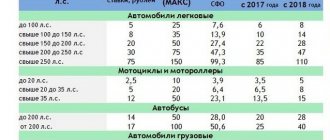Transport tax for organizations from 2021
Transport tax for legal entities refers to regional types of tax payments and is regulated at the federal level (Chapter 28 of the Tax Code), as well as local (regulatory legal acts of the authorities of the constituent entities of the Russian Federation). In accordance with stat. 356 of the Tax Code, regions approve TN rates, terms of payment, benefits and legal grounds for their application. In this case, the restrictions provided for by the Tax Code must be taken into account.
Who exactly is recognized as the taxpayer of this tax? According to stat. 357 of the Tax Code, transport tax for organizations is obligatory for payment if they own vehicles registered in the generally established order. Objects subject to taxation are listed in stat. 358. In particular, these are cars and trucks, motorcycles, buses of various sizes, boats, airplanes and helicopters, and other self-propelled vehicles of land, air and water types (clause 1 of Article 358). The list of non-taxable objects is given in paragraph 2 of the statute. 358.
Timely calculation of transport tax for legal entities is carried out separately for each object registered in the name of the owner (clause 2 of Article 362). Enterprises, unlike individuals, accrue TN on their own, including advance amounts. If the regional authorities do not approve reporting periods in a particular subject of the Russian Federation, the car tax is transferred to the budget in a single amount at the end of the year. Moreover, in accordance with the Tax Code, the tax period is a year (calendar), and the reporting period is quarters (stat. 360).
Will the transport tax for legal entities change in 2021? At the moment, there are no global innovations observed. No one canceled the TN, and the replacement with another fee also did not take place. As before, regional authorities are in charge of administration, approving final rates and payment deadlines. However, some innovations were nevertheless adopted by officials. The changes will affect owners of prestigious expensive cars worth 3-5 million rubles. The size of the increasing coefficient for them is set at a minimum level of 1.1 (stat. 362 of the Tax Code as updated by Law No. 355-FZ of November 27, 2017). Currently, the coefficient is 1.1, 1.3, 1.5.
Another change applies to the tax return form for TN, which was approved by the Federal Tax Service in Order No. ММВ-7-21/668 dated 12/05/16. The document was adopted in 2021, but in practice all legal entities are required to submit a new form when submitting information for 2021. Sections about payments to Platon, lines about the year of manufacture of the vehicle, information about the registration of the object and/or deregistration from state registration have been added to the form.
How to calculate horsepower tax?
The amount of payment for a car by horsepower includes taxes:
- rate - set by regional authorities, they also establish the possibility of discounts for certain categories of taxpayers;
- base - engine power in hp, and if in those. The documentation for the car contains instructions in kW, it must be converted to hp. (1 kW=1.36 hp).
It is calculated by multiplying one value by another. If the vehicle was not purchased at the beginning of the year, this should be reflected in the documentation and then the calculation formula will change slightly: NS * NB * X / 12, where X = number of months of operation of the vehicle.
How much will a car owner pay according to the law?
In 2015, legislation introduced changes regarding the luxury tax on cars based on horsepower. The updated list now includes many models that were not there until recently. Now it contains all the cars whose cost exceeds the cost threshold of 3 million rubles. All cars that are higher than this cost have their own coefficient, by which you need to multiply the above formula.
The coefficient, like the NS, has a regional link, that is, regional authorities are also involved in its calculation. Thus, a car owner from Moscow or, say, St. Petersburg, can pay a tax for his car in the amount of 10 thousand rubles, while, say, a vehicle owner from Ryazan or Pskov will pay only 7 thousand for the same model.
Calculation of car tax by horsepower: is it possible to pay online?
Of course, you can simplify the situation by getting the total amount on online services that are popular nowadays. To do this, just enter the region, type of car, its make and model (name). All of them are easy to use and do not require additional knowledge. For the most part, they do not even require you to go through the registration process. In rare cases (we recommend not using such portals), payment for services is required.
Transport tax - tariffs
The final tariff rates are adopted by regional authorities, taking into account the maximum/minimum restrictions under stat. 361. An increase in tariffs for certain types of vehicles in the Leningrad region has already been approved. and St. Petersburg, Ulyanovsk region, Arkhangelsk, Kirov and Kostroma. To know exactly how to calculate transport tax for legal entities, you need to clarify the interest rate for vehicles registered to the company. In this case, information is taken from the current version of the regional law.
Where to pay transport tax for legal entities
Transfer of TN based on the results of the year and quarters (in case of approval of reporting periods in a separate subject of the Russian Federation) is carried out to the regional budget at the address of the vehicle location (clause 1 of Article 363). The last address for all means of transportation, except for water ones, is the address of the location of the enterprise or OP (Article 83). If an organization is obligated to pay advances under the Taxpayer Agreement, such amounts reduce the total tax for the year.
The timing of the transfer of transport fees is regulated by the regions of the Russian Federation. In this case, the final payment date cannot be approved in the subject earlier than February 1 of the next year (clause 1 of Article 363). Here is a link to the stat. 363.1, which discusses the procedure for submitting a declaration. Accordingly, in the region, the deadline for transferring TN should not be set earlier than the date of filing the declaration, that is, earlier than February 1 (clause 3 of Article 363.1).
Transport tax for legal entities – payment deadlines in 2018
As a rule, the deadlines for transferring TN for reporting periods are approved before the last day of the next calendar month. For example, in the Rostov region. advances for the 1st, 2nd and 3rd quarters must be paid before 05/03/18, 07/31/18, 10/31/18. Moreover, if the last date of the month falls on a weekend or official holiday, the payment date is shifted to the first working day.
The final payment for TN for 2021 must be made by legal entities no earlier than 02/01/18. The deadlines adopted by the regional authorities are mandatory for all taxpayers. In case of violation, penalties are charged on the amount of arrears in accordance with the requirements of tax legislation for each day of delay. How is transport tax calculated for legal entities? More on this below.
Truck rates in 2021
There is not and cannot be a single tax rate on trucks. Due to the fact that this fee is established at the regional level, the authorities of the constituent entities independently determine its size, taking into account the specifics of the area. Thus, what specific rate will be for the payer depends on where the vehicle is registered and where its owner is registered. When determining the size of the regional rate, the base rate is taken as a basis. Both quantities are correlated with each other, and the difference between them can reach a maximum of ten times larger and smaller. The base rate is determined by the capacity of the transport and is enshrined in Art. 361 of the Tax Code of the Russian Federation. Any object subject to TN, depending on the engine power, belongs to one of the categories in accordance with the table below.
Table - Basic tax rates for freight vehicles, rub.
| Engine power | Tax rate |
| Up to 100 | 2,5 |
| 100-150 | 4 |
| 150-200 | 5 |
| 200-250 | 6,5 |
| Over 250 | 8,5 |
According to clause 1 of Article 361 of the Tax Code of the Russian Federation “Tax rates”
Vehicles with a power exceeding 250 horsepower are considered super-heavy trucks, and such vehicles are subject to additional tax liability since 2014. The same applies to vehicles weighing over 12 tons. The additional duty is intended to compensate for the damage caused to the road surface and accumulate funds to restore its properties. In relation to such taxation, an independent procedure is provided for, enshrined in Government Decree No. 504 of June 14, 2013 “On the collection of fees to compensate for damage caused to public roads of federal significance by vehicles with a permissible maximum weight of over 12 tons.” The amount of tax is directly proportional to the kilometers traveled on federal roads and is paid at the rate of 3.5 rubles per 1 km of travel.
Calculation of transport tax for legal entities
The procedure for calculating TN and advances is defined in stat. 362 NK. For the calculation, indicators of the tax base of the transport facility and the current rate in the region are taken. Additionally, the values of the increasing coefficient and the coefficient of actual vehicle ownership for the tax period are taken into account. The general calculation formula is as follows:
TN = NB x St in % x PovK x FactK, where:
TN - transport tax,
NB – facility power in liters. With. (for auto),
St. in % - the rate for the object in %, valid in the region,
PovK - increasing coefficient for premium cars according to clause 2 of the stat. 362,
FactK – coefficient of actual vehicle ownership for the tax period. Calculated according to the rules of clause 3 of stat. 362.
If an enterprise has several vehicles, the tax is determined separately for each. The results of the calculations are presented to the Federal Tax Service at the place of registration of the car owner in the form of a declaration for the tax period, that is, the calendar year.
New vehicle tax rules will come into force in 2021
From 2021, uniform deadlines for payment of transport tax and advance payments on it have been introduced for corporate taxpayers. Thus, the tax is payable no later than March 1 of the year following the expired tax period, and advance payments for it, if they are introduced by the law of a constituent entity of the Russian Federation, no later than the last day of the month following the expired reporting period.
Also, for the tax period 2021 and subsequent periods, the obligation to submit a transport tax return to the tax authority is canceled. This solution reduces business costs for preparing tax reporting and shortens the process of identifying arrears.
To ensure complete payment of tax, starting next year, organizations will be sent messages about the amounts of transport tax calculated by the tax authorities. They are compiled on the basis of information available to the tax authority, including information received from government agencies registering vehicles, as well as information about tax benefits declared by the company. Such messages are sent within the following time frames:
no later than six months from the date of expiration of the established deadline for payment of tax for the expired tax period;
no later than two months from the date the tax authority receives information entailing recalculation of tax for previous tax periods;
no later than one month from the date the tax authority receives information from the Unified State Register of Legal Entities that the organization is in the process of liquidation.
The message is sent via TKS or through the taxpayer’s personal account, and if it is impossible to transmit by these methods, it is sent by registered mail or handed to the head or representative of the organization personally against signature.
For individual taxpayers, starting from 2021, the amendment introduced to paragraph 2 of Art. 52 of the Tax Code of the Russian Federation. Now the tax authorities take into account all amounts of overpaid property taxes, personal income tax and penalties available to a citizen as of the date of generation of the tax notice, if before the date of generation of the tax notice the tax authority has not received an application for a credit or refund of the amounts of overpaid tax. This ensures “end-to-end” intertax accounting of overpayments in favor of an individual for all periods of its occurrence.
From July 1, 2021, a rule will apply that transport tax will not be recalculated if it entails an increase in the previously paid tax amount according to the tax notice. This provision is aimed at observing the legitimate interests of bona fide taxpayers who have paid tax notices on time. A similar condition applies from 2021 to the recalculation of land tax and property tax for individuals.
Starting next year, a new procedure for calculating tax will apply to a vehicle that has ceased to exist due to its loss or destruction. As a general rule, the tax is calculated on the basis of information submitted to the Federal Tax Service of Russia by the bodies conducting state registration of vehicles. Now an exception has been made from it for objects that have ceased to exist: the calculation of tax on them ceases from the first day of the month of their death or destruction on the basis of an application submitted by a citizen to the tax authority.
Does the individual entrepreneur pay transport tax?
Often, in their business activities, businessmen use their own transport. In this case, who is obliged to pay the TN state – an entrepreneur or a citizen? To understand the issue, you need to carefully study the registration documents for the object. Since when registering a car, the certificate indicates an individual and not an individual entrepreneur, an ordinary person also becomes a taxpayer. Consequently, the entrepreneur pays property taxes, including transport and land taxes, on behalf of the citizen, without indicating the legal status of the individual entrepreneur.
Conclusion - we looked at how transport tax is paid by legal entities in accordance with legal requirements. To remain a bona fide taxpayer, an organization must independently calculate and pay the car tax according to the rates and deadlines accepted in the region. In case of violations of regulations, administrative and tax penalties may be applied to the enterprise.
ARE THERE GROUNDS FOR CANCELLATION OF TRANSPORT TAX FOR INDIVIDUALS
Many motorists and car owners are looking for just such information on the Internet, since it is very relevant for them, and due to the fact that on the territory of the Russian Federation many laws, as well as legislative acts, especially in recent years, often bring about certain changes and editing, then such fake news did not come as a surprise.
As mentioned earlier, throughout 2021, the possibility of abolishing the transport tax for individuals was actively discussed several times online. Some people believed in such news due to the fact that the government made several edits and amendments to some legislative acts.
In December 2021, a new law on tax amnesty for debts, as well as taxes related to land and transport, was signed. This law came into force on January 1, 2021. Let us recall that Dmitry Medvedev actually introduced a bill to the State Duma that concerns the abolition of the tax on electric cars for a period of 5 years, but not on conventional cars. By the way, this bill never received the required number of support votes in the State Duma.
Also, representatives of the Federal Tax Service commented on this fake news on their official page, they said that the transport tax will not be canceled in the near future and denied such rumors.
Some fake experts linked the fake news about the abolition of the transport tax with the fact that the cost of gasoline will rise significantly next year.
Thus, they argued that the state wants to abolish the transport tax for those citizens who actively use the car every day and, accordingly, often refuel it, thus spending a large amount of money on gasoline and other types of fuel.






